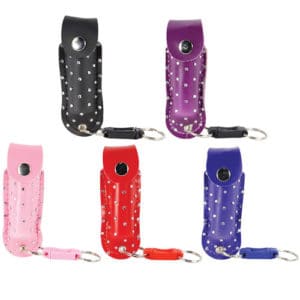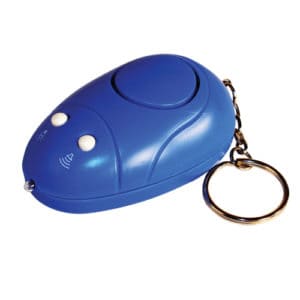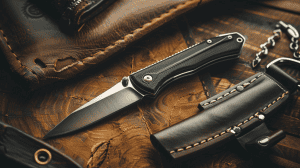When deciding to carry legal self-defense weapons, you must understand your options and the laws governing their use. Firearms typically require permits and training, while non-lethal tools like pepper spray and stun guns are widely accessible, with an effectiveness rate over 85% for deterrence. Always check local regulations for each weapon, especially on knife blade length or decibel limits for personal alarms. Proper storage, regular practice, and self-defense classes are critical for responsible ownership and proficiency. Staying informed about legal repercussions guarantees safe and lawful carry, so further exploring the specifics will greatly benefit you.
Key Takeaways
- Understand and comply with local laws and permit requirements for carrying self-defense weapons.
- Regularly train with your chosen self-defense weapon to ensure proficiency and readiness.
- Be aware of prohibited areas where carrying weapons is not allowed, such as airports and schools.
- Choose non-lethal options like pepper spray or stun guns for effective self-defense with minimal legal risk.
Pepper Spray
 Regarding non-lethal self-defense, pepper spray is one of the most effective and accessible options available. It works by causing an intense burning sensation in the eyes, nose, and throat of the attacker, temporarily incapacitating them and giving them time to escape. Studies have shown that pepper spray effectiveness is high, with a success rate of deterring or stopping an attacker in over 85% of cases. It’s a reliable tool for personal safety, especially for those who prefer a non-lethal form of defense.
Regarding non-lethal self-defense, pepper spray is one of the most effective and accessible options available. It works by causing an intense burning sensation in the eyes, nose, and throat of the attacker, temporarily incapacitating them and giving them time to escape. Studies have shown that pepper spray effectiveness is high, with a success rate of deterring or stopping an attacker in over 85% of cases. It’s a reliable tool for personal safety, especially for those who prefer a non-lethal form of defense.
However, you must be aware of pepper spray regulations in your area. You can legally carry and use pepper spray in many places for self-defense. Still, there are often specific rules about the concentration of the active ingredient, oleoresin capsicum (OC), and the size of the canister.
Some states may require you to be over a certain age or prohibit carrying it in certain locations. Before purchasing pepper spray, check your local laws to guarantee compliance. Knowing the regulations will help you carry and use pepper spray responsibly and legally, maximizing its benefits while avoiding potential legal issues.
Stun Guns
Stun guns offer a powerful and immediate means of self-defense by delivering a high-voltage electric shock to an attacker. This quick jolt can incapacitate an assailant, giving you precious moments to escape. Stun gun effectiveness is well-documented: they disrupt the attacker’s muscle control, causing disorientation and temporary paralysis. However, it’s essential to understand stun gun legality, as laws vary by region.
Before you purchase a stun gun, check your local regulations. Some states and municipalities have restrictions or outright bans on their possession and use. Make sure you’re compliant to avoid legal issues. Additionally, familiarize yourself with proper usage techniques to maximize effectiveness and safety.
Here’s a quick comparison of stun gun models:
| Model | Voltage Output | Features |
|---|---|---|
| Vipertek VTS-989 | 53 million volts | Built-in LED flashlight, anti-grab electrodes |
| Sabre S-1005 | 1.139 µC charge | Safety switch, compact design |
| Taser Pulse+ | 50,000 volts | Integrated with Noonlight app for alerts |
Knowing your options and legal boundaries helps you make informed decisions. Always carry your stun gun responsibly, keeping it accessible but secure. Practice regularly to guarantee you can respond effectively if the need arises.
Personal Alarms
 Personal alarms are an effective and non-lethal self-defense tool that can deter attackers by emitting a loud, attention-grabbing sound. These devices are compact and easy to carry, often fitting on your keychain or in your pocket. When activated, they produce a high-decibel noise, usually above 120 decibels, designed to startle an assailant and alert others nearby.
Personal alarms are an effective and non-lethal self-defense tool that can deter attackers by emitting a loud, attention-grabbing sound. These devices are compact and easy to carry, often fitting on your keychain or in your pocket. When activated, they produce a high-decibel noise, usually above 120 decibels, designed to startle an assailant and alert others nearby.
Understanding personal alarm features is vital for selecting the right one. Look for alarms with a loud, piercing sound, preferably over 130 decibels, as higher decibel levels are more effective in deterring attackers. Some models include flashing lights, adding a visual element to the alarm. Rechargeable batteries or long-lasting power sources are also important, guaranteeing your device is always ready for use.
Effective alarm usage involves knowing when and how to activate it. Practice pulling the pin or pressing the button quickly so you’re prepared in an emergency. Always carry the alarm in an easily accessible location, such as attached to your keys or clipped to your bag. Regularly test the alarm to guarantee it functions correctly, and replace batteries as needed.
Tactical Pens
Tactical pens are versatile self-defense tools that combine the functionality of a writing instrument with the durability needed for protection. These pens are designed to be discreet yet effective, making them an excellent choice for everyday carry. Tactical pen features often include a sturdy metal body, a pointed end for striking, and a writing tip that functions like any regular pen.
When choosing a tactical pen, look for these essential features:
- Durable Construction: Made from materials like aircraft-grade aluminum or stainless steel.
- Grip Design: Textured or grooved surfaces for a secure hold.
To use a tactical pen effectively, familiarize yourself with various tactical pen techniques. Hold the pen firmly in your hand, ensuring your thumb is on the top for added control. Aim for vulnerable areas such as the eyes, throat, or hands. Practicing these techniques can increase your confidence and readiness in a self-defense situation.
In addition to self-defense, tactical pens can also serve practical purposes in emergency scenarios, such as breaking glass or providing light. This dual functionality makes them a valuable addition to your everyday carry items.
Keychain Weapons
Keychain weapons offer practical self-defense options that are easy to carry and conceal. Popular choices include kubotans, pepper spray keychains, and small tactical flashlights, each designed for quick access and effectiveness. Before choosing one, you’ll need to understand the legal carry guidelines in your area to guarantee compliance with local laws.
Popular Keychain Options
Among the most discreet self-defense tools, keychain weapons offer both convenience and functionality for personal safety. These versatile gadgets not only keep you safe but also blend seamlessly with your everyday items. Keychain safety is paramount; understanding the best options can considerably enhance your personal protection strategy.
 Here are three popular keychain options to take into account:
Here are three popular keychain options to take into account:
- Pepper Spray Keychains: Compact and potent, these keychains can incapacitate an attacker from a distance. Most models feature a quick-release mechanism, allowing you to detach and use the spray swiftly.
- Kubotans: These small, solid rods can be used for striking or pressure point self-defense. Typically made of metal or hard plastic, kubotans are easy to grip and highly effective in close combat situations.
When selecting a keychain weapon, ensure it’s easy to carry and deploy. Practice using your chosen tool regularly to become familiar with its operation.
- Remember, the best self-defense tool is one you can access and use quickly in an emergency.
- Prioritize keychain safety and personal protection to enhance your overall security.
Legal Carry Guidelines
Understanding the legal carry guidelines for keychain weapons guarantees you stay compliant with local laws while enhancing your personal safety. Compliance with self-defense laws is vital to avoid any legal repercussions.
Research your local and state laws thoroughly, as carry restrictions can vary greatly. Some areas permit certain types of keychain weapons, such as pepper spray or personal alarms, while others may have stringent regulations or outright bans.
When choosing a keychain weapon, ensure it meets your region’s legal specifications. For instance, pepper spray often limits the maximum allowed concentration of active ingredients. Similarly, tactical pens or kubotans may be regulated based on their size and design. Always verify these details to avoid unintentional violations.
Moreover, understanding carry restrictions can prevent complications. Airports, government buildings, and schools usually have strict policies against weapons, including keychain varieties. Thus, it’s vital to plan ahead and remove your keychain weapon before entering such areas.
Self-Defense Knives
 Self-defense knives are practical tools that can provide a vital advantage in dangerous situations. Before you carry one, it’s important to understand the self-defense techniques and knife laws relevant to your area. Properly using a self-defense knife requires both skill and knowledge of the legal landscape.
Self-defense knives are practical tools that can provide a vital advantage in dangerous situations. Before you carry one, it’s important to understand the self-defense techniques and knife laws relevant to your area. Properly using a self-defense knife requires both skill and knowledge of the legal landscape.
When considering a self-defense knife, you should focus on:
- Blade Type: Choose a blade that’s designed for self-defense, such as a fixed blade or a folding knife with a secure locking mechanism.
- Size and Concealability: Confirm that the knife is legal in size and can be easily carried without drawing unnecessary attention.
Learning self-defense techniques is important. Training with your knife will help you react effectively under stress. Many martial arts schools offer specialized courses in knife defense, which can boost your confidence and proficiency.
Equally important are knife laws. These can vary greatly by jurisdiction, so knowing the specific regulations in your area will help you avoid legal trouble. Always confirm your knife complies with local laws regarding blade length, concealed carry, and permissible locations.
Legal Firearms
While knives offer close-range protection, legal firearms provide a broader range of self-defense options for those who are properly trained and licensed.
In many regions, carrying a firearm legally requires not only a permit but also a thorough understanding of firearm safety and local laws. The primary goal of firearm safety is to prevent accidents, which can be achieved by following the Four Basic Rules: treat every firearm as if it’s loaded, never point it at anything you’re not willing to destroy, keep your finger off the trigger until ready to fire, and be sure of your target and what’s beyond it.
For those considering concealed carry, it’s vital to undergo appropriate training and obtain the necessary permits. Concealed carry laws vary by state, so make sure to research the specific requirements in your area. Proper training includes not only marksmanship but also situational awareness and decision-making under stress.
Additionally, investing in a reliable holster that keeps your firearm secure and easily accessible is critical.
Statistics show that responsible firearm owners who practice regular training and adhere to safety protocols greatly reduce the risk of accidental discharge and misuse. You can effectively use legal firearms for self-defense by staying informed and prepared.
Batons and Sticks
When considering batons and sticks for self-defense, you’ll want to understand the different types available, including collapsible batons and fixed nightsticks, each serving unique purposes.
- It’s essential to know the legal carry guidelines for these tools, as laws can vary greatly by jurisdiction, impacting where and how you can possess them.
- Understanding these aspects will guarantee you choose the right baton for your needs while staying within legal boundaries.
Types of Batons
 Batons and sticks come in various forms, each designed to provide a different level of defense and usability. When selecting a baton, it’s important to consider the materials used, as they impact durability and effectiveness. Common materials include steel, aluminum, and polycarbonate. Each has unique properties that influence weight, strength, and flexibility.
Batons and sticks come in various forms, each designed to provide a different level of defense and usability. When selecting a baton, it’s important to consider the materials used, as they impact durability and effectiveness. Common materials include steel, aluminum, and polycarbonate. Each has unique properties that influence weight, strength, and flexibility.
Understanding baton techniques is critical for effective use. Proper training guarantees you can deploy the baton quickly and strike accurately. Techniques often focus on targeting vulnerable areas, like joints, to incapacitate an attacker without causing permanent harm.
Here are three popular types of batons:
- Expandable Batons: These can extend with a flick of the wrist, making them easy to carry and conceal.
- Fixed-Length Batons: Known for their reliability, they provide consistent performance but can be bulkier.
When choosing the right baton, consider your comfort and familiarity with the device. Each type has its strengths; the best choice depends on your specific needs and circumstances.
Legal Carry Guidelines
Understanding the legal carry guidelines for batons and sticks guarantees you’re prepared and compliant with local laws while defending yourself.
First, it’s crucial to know that state laws vary considerably regarding the possession and use of these self-defense tools. Some states, like California and New York, have stringent regulations, often requiring carry permits for lawful possession. In contrast, states like Texas and Florida have more lenient laws, allowing individuals to carry batons without specific permits.
When considering carrying a baton or stick, check the specific requirements in your state. Many states may require you to obtain a carry permit, which often involves background checks and safety training courses. Additionally, some local jurisdictions within a state might have their own regulations, so always verify local laws.
Moreover, the length and type of baton can also impact its legality. For instance, expandable batons might be legal in one state but restricted in another. Always verify that your self-defense tool complies with state and local guidelines to avoid legal issues.
Self-Defense Training
 Self-defense training equips you with the skills and confidence to protect yourself in dangerous situations effectively. Understanding self-defense psychology is vital, preparing your mind to respond quickly and efficiently. Equally important is situational awareness, which helps you recognize potential threats before they escalate.
Self-defense training equips you with the skills and confidence to protect yourself in dangerous situations effectively. Understanding self-defense psychology is vital, preparing your mind to respond quickly and efficiently. Equally important is situational awareness, which helps you recognize potential threats before they escalate.
In your self-defense training, you’ll learn how to:
- Identify and avoid danger: Developing situational awareness means alerting your surroundings, noting exits, and recognizing suspicious behavior.
- React under pressure: Training builds your ability to stay calm and make quick, informed decisions during high-stress situations.
Studies show that individuals trained in self-defense are more likely to escape dangerous encounters unscathed. Beyond physical skills, the psychological benefits include increased confidence and reduced anxiety about personal safety. Whether you’re using legal self-defense weapons or relying on your body, training guarantees you know when and how to act.
Finding a reputable training program that covers both the physical and mental aspects of self-defense is essential. Regular practice and drills will help solidify these skills, making them second nature in real-life scenarios.
Legal Considerations
When considering legal self-defense weapons, it’s crucial to understand your area’s specific laws and regulations to guarantee you’re compliant. Legal restrictions on self-defense weapons vary widely by state and even by city. Research the self-defense laws applicable to your location, as some regions may require permits for certain items or completely ban others. For instance, stun guns and pepper sprays are legal in many places but are restricted or banned in others.
Additionally, pay attention to how these laws define the use of these weapons. Self-defense laws often stipulate that you can only use force when reasonably believing you’re in imminent danger. Excessive or preemptive use could result in legal consequences.
Keep informed about “stand your ground” laws and “duty to retreat” laws, as they can greatly impact your legal defense.



